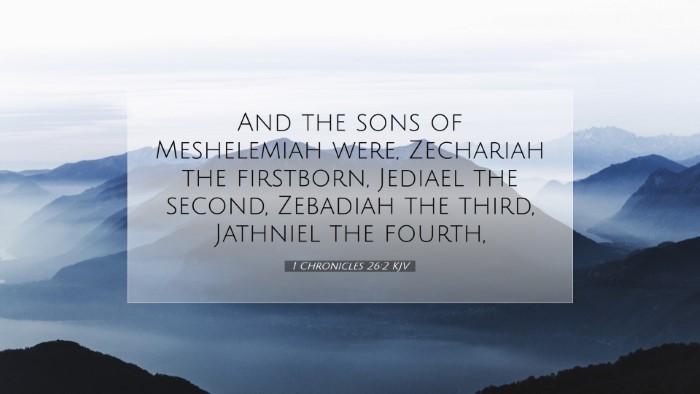Commentary on 1 Chronicles 26:2
Verse: 1 Chronicles 26:2 (KJV)
"And the chief of the Levites was Ahijah; he and his brethren, the sons of Merari, did the work of the Lord in the house of the Lord."
Introduction
This verse introduces key characters and their roles within the Levitical structures established for the service of the tabernacle. It highlights the importance of order and responsibility in the worship practices of ancient Israel.
Contextual Background
The books of Chronicles focus primarily on the lineage and leadership, stressing the significance of correct worship and priestly duties. As such, this passage not only provides a genealogical list but also emphasizes the practical organization necessary for the worship of God.
Exegesis and Interpretation
-
Ahijah as Chief of the Levites
Ahijah is identified as a leader among the Levites, suggesting he played a pivotal role in organizing the service and duties associated with the tabernacle. His name, which can mean "brother of Jehovah," signifies a deep connection with the worship of God.
-
The Sons of Merari
The mention of the sons of Merari reflects the division of labor within the Levites. Merari’s descendants were responsible for the more burdensome tasks associated with the tabernacle, indicating the necessity of each group fulfilling their God-ordained roles.
Theological Implications
This passage invites deeper reflection on God's design for order in worship. The meticulous structure within the Levitical priesthood serves as a model for contemporary worship, reminding leaders today of the importance of organization and accountability.
Worship in Order
The act of worship is not simply spontaneous; it is also a service requiring structure and commitment. As evidenced in this verse, the roles assigned to the Levites signify that worship is a collaborative effort requiring dedicated individuals to undertake specific functions.
God's Sovereignty in Assignments
The appointment of Ahijah and the organization within the Levites indicate God's sovereign role in assigning duties. Every member of the body of Christ is appointed for specific tasks, aligning with the New Testament's teaching on spiritual gifts.
Insights from Public Domain Commentaries
Matthew Henry
Matthew Henry emphasizes the importance of the Levites’ service and the divine order established in Israel. He notes that each family had its designated duties, which were essential for maintaining the sanctity of worship. Henry also points out that leaders, like Ahijah, are responsible for guiding their brethren in the proper observance of their offices.
Albert Barnes
Albert Barnes highlights the significance of genealogical lists, seeing them as affirmations of God’s faithfulness to His promises. Each leader, particularly Ahijah, serves as a reminder of the continuity of God's plans through the generations. Barnes stresses that every person’s role within the Levitical system was vital for the overarching narrative of redemptive history.
Adam Clarke
Adam Clarke offers insights on the practical implications of the roles assigned to the Levites. He argues that understanding these historical duties aids in grasping the nature of worship in both the Old Testament and today. Clarke often highlights how the themes of service and dedication remain crucial for modern believers as they participate in the church's life.
Application for Today
In the contemporary church, it is pertinent to reflect upon the necessity of each member's role within the body of Christ. Just as Ahijah and the sons of Merari had distinct responsibilities in the worship of God, so too does the modern congregation need individuals committed to their spiritual gifts and functions.
Challenges for Today's Church
As the church faces various challenges, including leadership transitions and cultural shifts, the organized and purposeful worship demonstrated in this verse serves as a model. Pastors and leaders should draw from the structure seen in the Levitical assignments to foster a collaborative environment where every member feels valued and accountable.
Conclusion
1 Chronicles 26:2 encapsulates the essence of order, responsibility, and divine calling within the worship practices of ancient Israel. The insights from historical commentaries provide valuable lessons for modern believers about the importance of each member's involvement in the church's life. As the church continues to navigate the complexities of worship in contemporary society, the structured approach exemplified by Ahijah and the Levites offers a blueprint for effective service unto the Lord.


